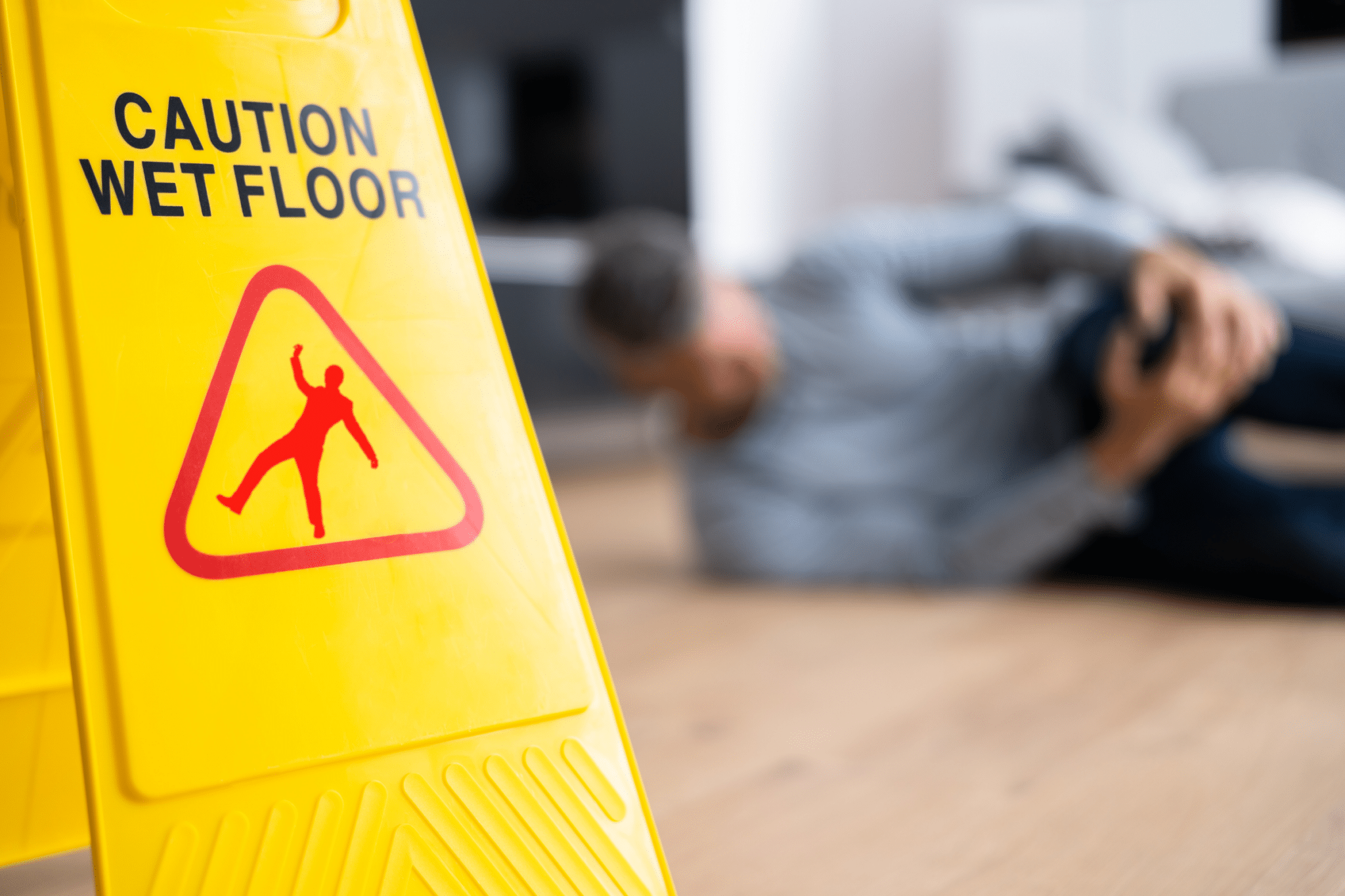
Unlock the secrets to securing the maximum compensation for your slip and fall injury with expert legal guidance. Navigating the complexities of slip and fall claims requires not just knowledge of the law, but also an understanding of the many factors that contribute to a successful case. In this article, we’ll delve deeper into strategies and insights that can significantly enhance your chances of receiving the compensation you deserve.

Understanding Slip and Fall Claims: The Basics
Slip and fall claims fall under the broader category of premises liability, which holds property owners and managers responsible for maintaining a safe environment. These claims typically arise when an individual is injured due to a slip, trip, or fall as a result of a hazardous condition on someone else’s property. To establish a valid claim, one must prove that the property owner knew or should have known about the dangerous condition and failed to address it in a timely manner.
It’s important to understand that not all accidents on someone else’s property qualify for a slip and fall claim. The specific circumstances surrounding the accident, as well as the nature of the property, play a crucial role in determining liability. For example, if an individual slips on a wet floor in a grocery store, the store management may be liable if they failed to put up appropriate signage or clean up the spill promptly. Therefore, gathering as much information as possible about the incident is paramount.
Understanding the legal framework is crucial for a successful slip and fall claim. This includes being aware of the statute of limitations for filing a lawsuit, the role of comparative negligence, and the types of evidence that are most compelling in these cases. Statutes of limitations vary by state; as such, victims should act quickly to preserve their rights. In many states, you may have as little as one year to file a claim. Also, comparative negligence can impact the awarded damages, depending on how much fault is attributed to the victim in the accident.
Gathering Comprehensive Evidence to Support Your Case
Collecting strong evidence is vital for substantiating your slip and fall claim. This includes taking immediate photographs of the accident scene and your injuries, obtaining the contact information of any witnesses, and retaining all medical records and bills related to your treatment. Documentation of lost wages and any other financial losses incurred as a result of the injury should also be compiled. The more thorough your documentation, the stronger your case will be.
Moreover, it’s beneficial to secure surveillance footage if available, incident reports, and maintenance records that can provide insights into the property owner’s regular practices. Such evidence can significantly bolster your claim by establishing a pattern of negligence or by directly capturing the incident. For example, if surveillance footage shows a slippery floor without any warning signs, it can serve as powerful evidence of the property owner’s negligence.
Calculating the Full Extent of Your Damages
Accurately assessing the total impact of your injuries is essential for demanding fair compensation. This not only includes direct costs such as medical expenses and lost income but also accounts for non-economic damages like pain and suffering, emotional distress, and loss of enjoyment of life. It’s crucial to consider long-term effects of your injuries. For instance, if you sustained a serious injury that limits your mobility, you may need ongoing physical therapy or might not be able to return to work for an extended period. In some cases, punitive damages may be sought if the negligence was particularly egregious.
Working with economic and medical experts can help quantify these damages. They can project future costs and offer a thorough understanding of how your injuries will affect your life. A comprehensive calculation ensures you seek a settlement that fully covers both current and anticipated losses. For instance, if a medical professional indicates you’ll require surgery in the future, this can be included in your damages assessment.
Negotiating with Insurance Companies: Strategies for Success
Dealing with insurance companies can be challenging as they often aim to minimize payouts. Effective negotiation strategies include presenting a well-documented case that clearly demonstrates the property owner’s liability and your resulting damages. It’s also important to be patient and not accept the first offer, as initial settlements are frequently lower than what may be fair. When you receive an offer, take the time to analyze it thoroughly and consult with your lawyer before making a decision.
Slip and fall claim
Remember, if you have been injured in a slip and fall accident, it is crucial to understand your rights and the steps you need to take to ensure a successful claim. With the right legal guidance and a proactive approach, you can navigate the challenges ahead and work towards obtaining the compensation that reflects your needs and losses. Your slip and fall claim deserves the utmost attention and care, so take action today!
Final Thoughts on Your Slip and Fall Claim
In conclusion, pursuing a slip and fall claim can be a complex and nuanced process. With the right understanding of the legal framework, comprehensive evidence, and skilled representation, you can significantly enhance your chances of achieving a favorable outcome. Always remember to act swiftly and seek professional legal advice to navigate the intricacies of your situation. Your health and recovery should be your priority, and a successful claim can help facilitate that.
The journey to securing compensation for your slip and fall injury may be challenging, but with the right tools and support, you can overcome these obstacles and move towards a brighter, healthier future. Don’t hesitate to reach out for help; getting started on your claim can make all the difference.
The Impact of Social Media on Slip and Fall Claims
In today’s digital age, social media can significantly influence your slip and fall claim. Insurance companies often monitor social media profiles to gather information that could undermine your case. For instance, posting photos of yourself engaging in activities after an injury could be used against you to argue that your injuries are not as severe as claimed.
It’s advisable to limit your social media activity during the claim process and consult your lawyer about what is appropriate to share. Maintaining a low profile can help protect your case and ensure that you present the strongest claim possible.
Understanding Comparative Negligence in Slip and Fall Cases
Comparative negligence is a legal principle that can affect the compensation you receive in a slip and fall claim. If you are found to be partially at fault for the accident, your compensation may be reduced based on your percentage of fault. For example, if you slipped because of a wet floor but were also distracted by your phone, the court may determine you were 30% responsible. Consequently, your total damages would be reduced by that percentage.
Being aware of how comparative negligence works can help you prepare your case more effectively. Your lawyer can help you understand how to present your case to minimize the impact of any potential claims of fault against you, ensuring that you still receive fair compensation.
The Role of Witnesses in Slip and Fall Claims
Witnesses can play a crucial role in supporting your slip and fall claim. Eyewitness accounts can help corroborate your story and provide an objective perspective on the incident. It’s beneficial to gather contact information from witnesses at the scene, as their testimonies can be invaluable when establishing liability.
Furthermore, witnesses can provide details that you may have overlooked in the moment. For example, a witness might have noticed that the store employee had walked past the hazardous area multiple times without taking action. This type of evidence can significantly strengthen your case against the property owner.
Common Misconceptions About Slip and Fall Claims
There are several misconceptions surrounding slip and fall claims that can mislead potential claimants. One common belief is that you can only claim if you were severely injured. In reality, even minor injuries can lead to significant compensation, especially if they result in medical bills or lost wages. Another misconception is that all slip and fall claims are easy to win. The truth is that each case is unique, and several factors can complicate a claim, including the property owner’s defense strategy.
Understanding these misconceptions can empower individuals to pursue their claims more effectively. It’s essential to approach the process with realistic expectations and seek out legal guidance to navigate the complex landscape of personal injury law.
The Importance of Timely Action Post-Injury
After sustaining an injury from a slip and fall, it is vital to take prompt action. Not only can this help ensure your safety and recovery, but it also preserves your rights to pursue a claim. Seek medical attention immediately, even if injuries appear minor, as some symptoms may not manifest right away. Documenting your injuries and treatment is essential for your case.
Additionally, notifying the property owner or manager about the incident can be a critical step. This not only provides them with the opportunity to address any hazardous conditions but also creates an official record of the incident. This record can be crucial when you later file a claim or lawsuit. Delaying these actions could adversely affect your ability to seek compensation.
Enlisting a seasoned personal injury lawyer can be advantageous. They understand the tactics insurers use and how to counter them. A skilled negotiator will leverage the strength of your evidence to advocate for a settlement that truly compensates for your losses. Additionally, experienced lawyers can articulate the emotional and physical toll the accident has had on your life, which can significantly influence the negotiation process.
Dealing with insurance companies can be challenging as they often aim to minimize payouts. Effective negotiation strategies include presenting a well-documented case that clearly demonstrates the property owner’s liability and your resulting damages. It’s also important to be patient and not accept the first offer, as initial settlements are frequently lower than what may be fair.
Enlisting a seasoned personal injury lawyer can be advantageous. They understand the tactics insurers use and how to counter them. A skilled negotiator will leverage the strength of your evidence to advocate for a settlement that truly compensates for your losses.
Choosing the Right Personal Injury Lawyer for Your Case
Selecting an experienced personal injury lawyer is pivotal to the outcome of your slip and fall claim. Look for a legal professional with a track record of success in similar cases and who demonstrates a deep understanding of premises liability law. It’s important that they have the resources to thoroughly investigate your claim and go to trial if necessary. During consultations, ask about their previous case results and how they plan to approach your case specifically.
The right lawyer will offer a clear communication plan, be transparent about their fee structure, and provide personalized attention to your case. Establishing a comfortable and confident relationship with your attorney will contribute to a smoother legal process and a better chance at receiving the compensation you deserve for your injuries. When you have an attorney who is genuinely invested in your case, it can help alleviate some of the stress associated with the claim process.
Selecting an experienced personal injury lawyer is pivotal to the outcome of your slip and fall claim. Look for a legal professional with a track record of success in similar cases and who demonstrates a deep understanding of premises liability law. It’s important that they have the resources to thoroughly investigate your claim and go to trial if necessary.
The right lawyer will offer a clear communication plan, be transparent about their fee structure, and provide personalized attention to your case. Establishing a comfortable and confident relationship with your attorney will contribute to a smoother legal process and a better chance at receiving the compensation you deserve for your injuries.




